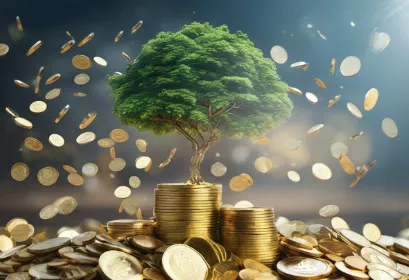In today’s interconnected world, the pursuit of economic growth often clashes with environmental concerns. However, a new paradigm is emerging, one taht recognizes the intrinsic link between economic prosperity and environmental sustainability. This paradigm shift is known as sustainable economic development. By prioritizing environmental protection, social equity, and economic growth, nations can achieve long-term prosperity without compromising the planet’s health.
This article delves into the multifaceted concept of sustainable economic development, exploring its key drivers, challenges, and benefits. We will examine how green innovation, circular economy principles, and strategic investments in sustainability can unlock new opportunities and propel economies forward.
A Sustainable Future: The New Frontier of Economic Growth
The traditional model of economic development, often characterized by rapid industrialization and resource exploitation, is increasingly unsustainable. It leads to environmental degradation, social inequality, and economic instability. IN contrast, sustainable economic development offers a more holistic and enduring approach.
By integrating environmental considerations into economic decision-making, governments and businesses can create a more resilient and equitable future. This involves shifting towards cleaner energy sources, promoting sustainable agriculture practices, and investing in green infrastructure.
Key factors driving sustainable economic development:
- Climate change: The urgent need to mitigate climate change has accelerated the adoption of sustainable practices.
- Resource scarcity: Depleting natural resources highlight the importance of efficient resource utilization and circular economy principles.
- Consumer demand: Growing consumer awareness of environmental and social issues drives demand for sustainable products and services.
- Regulatory frameworks: Governments are increasingly implementing policies and regulations to promote sustainable development.
Green Innovation: The Engine of Sustainable Economic Development
Green innovation is the lifeblood of sustainable economic development. It involves the creation of new technologies, products, and services that are environmentally friendly and economically viable. By fostering a culture of innovation, nations can unlock new markets, create jobs, and improve quality of life.
Key areas of green innovation:
- Renewable energy: Harnessing renewable energy sources like solar, wind, and hydro power can reduce reliance on fossil fuels and mitigate climate change.
- Clean technologies: Developing clean technologies such as electric vehicles, energy-efficient appliances, and sustainable building materials can reduce environmental impact.
- Circular economy: Implementing circular economy principles, which involve reducing, reusing, and recycling materials, can minimize waste and conserve resources.
- Biotechnology: Advances in biotechnology can lead to the development of sustainable agriculture practices, biofuels, and other green products.
The Circular Economy: A Sustainable Model for the Future
The linear economy, characterized by a “take-make-dispose” model, is unsustainable in the long run. The circular economy, on the other hand, is a regenerative economic system that aims too keep products and materials in use for as long as possible. By designing products for durability, recyclability, and reuse, businesses can reduce waste, conserve resources, and create new economic opportunities.
Key principles of the circular economy:
- Design for the environment: Designing products with environmental impact in mind, considering factors like material choice, energy efficiency, and recyclability.
- Keep products and materials in use: Extending the lifespan of products through repair, refurbishment, and reuse.
- Recover materials: Recycling and composting materials to create new products and materials.
- Regenerate natural systems: Protecting and restoring ecosystems to ensure long-term sustainability.
Investing in Sustainability: The Key to Long-Term Economic Success
Investing in sustainability is not just an ethical imperative; its a sound economic strategy. By prioritizing sustainable practices, businesses can reduce costs, enhance brand reputation, and attract environmentally conscious consumers. Governments can also play a crucial role in promoting sustainable investment through supportive policies and incentives.
Key areas of sustainable investment:
- Green infrastructure: Investing in green infrastructure, such as renewable energy projects, sustainable transportation systems, and green buildings, can create jobs and stimulate economic growth.
- Sustainable finance: Promoting sustainable finance, including green bonds and impact investing, can channel capital towards environmentally and socially responsible projects.
- Corporate social responsibility: Encouraging corporate social responsibility initiatives, such as fair labor practices, ethical sourcing, and community engagement, can enhance a company’s reputation and long-term viability.
A Greener Planet, A Brighter Future: The Benefits of Sustainable Development
The benefits of sustainable economic development are far-reaching. By adopting sustainable practices, nations can improve public health, reduce poverty, and enhance social equity. Additionally, a healthy environment can boost tourism, increase agricultural productivity, and protect biodiversity.
Key benefits of sustainable development:
- Improved public health: Reducing pollution and promoting clean air and water can lead to better health outcomes.
- Reduced poverty: Sustainable development can create jobs, increase income, and reduce inequality.
- Enhanced social equity: Inclusive and equitable development can empower marginalized communities and promote social justice.
- Environmental protection: Protecting ecosystems, biodiversity, and natural resources can ensure teh long-term health of the planet.
- Economic growth: Sustainable practices can drive innovation, create new markets, and foster economic growth.
In conclusion, sustainable economic development is not just a trend; it’s a necessity. By embracing green innovation, circular economy principles, and strategic investments in sustainability, nations can build a more prosperous, equitable, nad resilient future. It’s time to recognize that a healthy planet is a prerequisite for a thriving economy. Let’s work together to create a sustainable future for generations to come.

